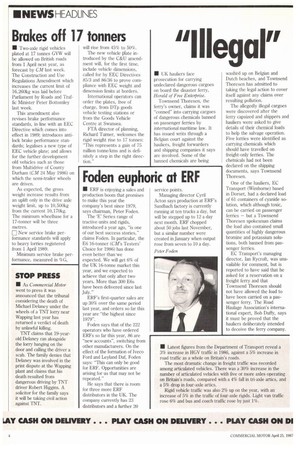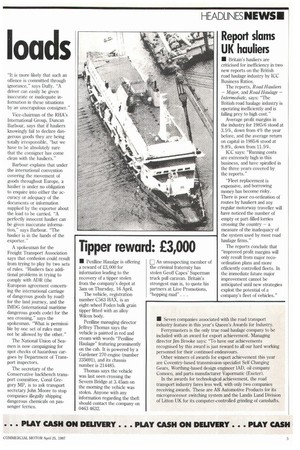"Illegal" loads
Page 6

Page 7

If you've noticed an error in this article please click here to report it so we can fix it.
• UK hauliers face prosecution for carrying undeclared dangerous cargoes on board the disaster ferry, Herald of Free Enterprise.
Townsend Thoresen, the ferry's owner, claims it was "conned" into carrying cargoes of dangerous chemicals banned on passenger ferries by international maritime law. It has issued writs through a Belgian court against the hauliers, freight forwarders and shipping companies it says are involved. Some of the banned chemicals are being washed up on Belgian and Dutch beaches, and Townsend Thoresen has admitted to taking the legal action to cover itself against any claims over resulting pollution.
The allegedly illegal cargoes were discovered after the ferry capsized and shippers and hauliers were asked to give details of their chemical loads to help the salvage operation. Five lorries were identified as carrying chemicals which should have travelled on freight-only ferries. The chemicals had not been declared on the shipping documents, says Townsend Thoresen.
One of the hauliers, EC Transport (Wimborne) based in Dorset, had a declared load of 61 containers of cyanide solution, which although toxic, can be carried on passenger ferries — but a Townsend Thoresen spokesman claims the load also contained small quantities of highly dangerous bromine and potassium solutions, both banned from passenger ferries.
EC Transport's managing director, Ian Rycroft, was unavailable for comment, but is reported to have said that he asked for a reservation on a freight ferry and that Townsend Thoresen should not have allowed the load to 'have been carried on a passenger ferry. The Road Haulage Association's international expert, Bob Duffy, says it must be proved that the hauliers deliberately intended to deceive the ferry company. "It is more likely that such an offence is committed through ignorance," says Duffy. "A driver can easily be given inaccurate or inadequate information in these situations by an unscrupulous consigner."
Vice-chairman of the RHA's International Group, Duncan Barbour, says that if hauliers knowingly fail to declare dangerous goods they are being totally irresponsible, "but we have to be absolutely sure that the consigner has come clean with the hauliers."
Barbour explains that under the international convention covering the movement of goods throughout Europe, a haulier is under no obligation to enquire into either the accuracy or adequacy of the documents or information supplied by the exporter about the load to be carried. "A perfectly innocent haulier can be given inaccurate information," says Barbour. "The haulier is in the hands of the exporter."
A spokesman for the Freight Transport Association says that confusion could result from trying to play by two sets of rules. "Hauliers face additional problems in trying to comply with ADR (the European agreement concerning the international carriage of dangerous goods by road) for the land journey, and the IMDG (international maritime dangerous goods code) for the sea crossing," says the spokesman. "What is permissible by one set of rules may not be allowed by the other."
The National Union of Seamen is now campaigning for spot checks of hazardous cargoes by Department of Transport inspectors.
The secretary of the Conservative backbench transport committee, Conal Gregory MP, is to ask transport secretary John Moore to stop companies illegally shipping dangerous chemicals on passenger ferries.
























































































































